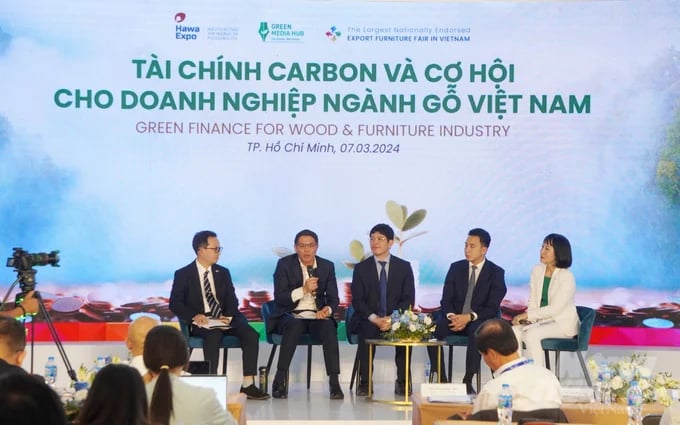May 31, 2025 | 03:33 GMT +7
May 31, 2025 | 03:33 GMT +7
Hotline: 0913.378.918
May 31, 2025 | 03:33 GMT +7
Hotline: 0913.378.918

Seminar "Green finance for wood and furniture industry" within the framework of HAWA EXPO 2024. Photo: Nguyen Thuy.
On the afternoon of March 7, the Organizing Committee of HAWA EXPO 2024 coordinated with the Green Media Hub under the Vietnam Journalists Association, and organized the discussion "Green finance for the wood and furniture industry".
According to Mr. Phung Quoc Man, Vice Chairman of HAWA, in 2023 Vietnam's wooden furniture export turnover has only reached $ 14.5 billion compared to $ 15.8 billion in 2022. One of the markets with the sharpest decline is the EU.
However, in the first 2 months of 2024, Vietnam's wooden furniture export turnover has shown signs of positive growth. In order for Vietnam's wood industry to grow in the coming time, according to Mr. Man, wood industry businesses need to clearly understand, meet and expand export markets, and take advantage of opportunities from multiple sides to increase business competitiveness.
At the seminar, speakers discussed green finance and carbon markets for Vietnam's wood and forestry industry.
According to Dr. Vu Tan Phuong, Director of the Vietnam Forest Certification Office (VFCO), Vietnam is one of the leading countries in wood and forest product processing. The policies are moving towards sustainable forestry and meet market requirements, including green finance and carbon markets. These are financial mechanisms that contribute to minimizing the impacts of climate change and solving environmental challenges in the current context.
"The major policy directions for forestry development by 2030 aim to achieve 1 million ha of forest certified for sustainable forest management; 100% of wood and wood products for export and domestic consumption originate from legal wood materials and wood with sustainable forest management certification, and 100% of the organization's forest area practices sustainable forest management", said Dr Vu Tan Phuong.
At the seminar, speakers also updated the latest information on the global and Vietnamese forest carbon credit markets.
Wood plays a role in absorbing and storing carbon, and is one of the few industries that produces negative greenhouse gas emissions compared to other industries with the same uses. These include stone production, stone handicrafts, or other raw material production industries such as plastic, concrete, steel...
The wood industry can take advantage of replacing the above materials in construction to reduce carbon emissions.
In particular, Vietnam with 14 million ha of forests, if managed sustainably, will create carbon credits by reducing greenhouse gas emissions, Increasing carbon absorption, increasing green finance for businesses, and bringing great value to the economy. But to create carbon credits, businesses must practice sustainable development (ESG) and are required to have emissions and emission reduction reports.
Experts say that it is necessary to continue to improve mechanisms and policies to encourage businesses to participate in sustainable forest management and use certified materials, developing production towards low carbon. Mechanisms and policies need to focus on financial incentives and investment incentives for greening production and producing goods that do not cause deforestation; promoting consumption of certified wood and wood products; monitoring mechanisms, creating fairness in the production and consumption of certified wood materials and wood products.
In addition, it is necessary to support capacity building for stakeholders in implementing sustainable forest management and greenhouse gas emission reduction activities.
Translated by Hoang Duy

(VAN) Vaccinating juvenile pangasius helps reduce disease, antibiotic use, and farming costs, increasing profits for export-oriented farmers in An Giang.

(VAN) Due to a limited supply of workforce and competitive recruitment requirements, businesses struggle to retain talented veterinary human resources.

(VAN) WOAH’s guidance aims to mitigate disease risks through a One Health approach that balances economic, conservation, and public health interests.

(VAN) Ms. Nguyen Thi Dung, Deputy Director of Ngoc Hoang Cooperative, shared about the journey of bringing dragon fruit to Europe, achieving annual revenues in the billions of VND.

(VAN) Bamboo products from Thang Tho Bamboo Cooperative have reached many countries around the world, while also creating jobs for local workers.

(VAN) The Management Board of Con Dao National Park reported that a green sea turtle, tagged in the Philippines, has traveled thousands of kilometers to lay 84 eggs on Bay Canh Islet.

(VAN) Green technology is paving a new path for sustainable aquaculture in the Mekong Delta in particular and across the country in general, helping reduce emissions and adapt to climate change.